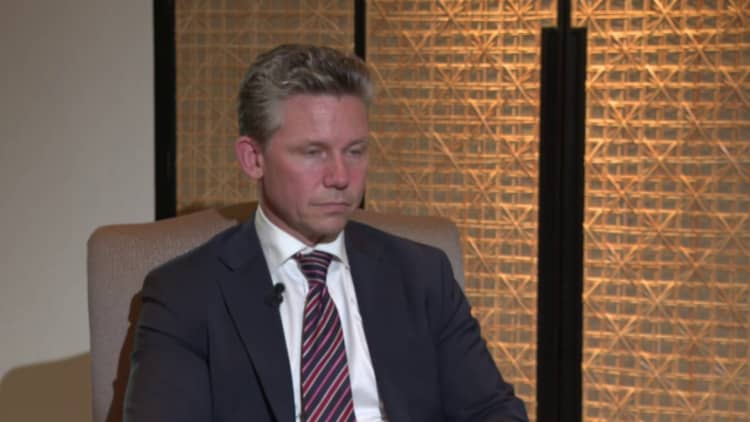[ad_1]
Sweden’s currency briefly hit a record low Thursday morning after the central bank raised interest rates.
Bloomberg | Bloomberg | Getty Images
Sweden’s krona hit a new record low Thursday after the country’s central bank raised rates and played down the possibility of market interventions as the currency falls and the economy slows.
The Swedish currency dropped to 0.0844 krona to the euro by early afternoon Thursday, after the Riksbank announced it would raise interest rates by 25 basis points. It also sank against the greenback.

Euro/Swedish krona.
The policy rate now sits at 3.75% and the figure is in line with forecasts made by analysts polled by Reuters. The bank also anticipates “at least one more” hike this year.
“Inflation is falling but is still far too high,” the Riksbank said in a statement. New service price data and a weaker krona mean inflation is falling “more slowly than expected,” it said.
One option available to the Swedish central bank is currency intervention, and it looked as though the Riksbank might have been leaning in that direction after it started to look at the possibility of hedging a portion of its foreign exchange reserves. But the Riksbank’s Governor Erik Thedeen said this type of move was “not a covert currency intervention,” speaking at a press conference Thursday according to a Reuters translation. He added he was “very skeptical of currency interventions.”
Further weakness in the krona could push the central bank closer to considering an intervention in the foreign exchange market, according to a note by ING, but threatening action is “more likely” than actually taking action, the researchers said.

Currency intervention is not the first solution the Riksbank would look to in order to bolster the krona, but “it’s definitely a tool that they have in their toolbox,” Patrik Sandell, financial risk management director at KPMG, told CNBC. But a currency that continues to weaken could prompt bankers to employ that tool, he said.
“If the slide would sort of accelerate … then maybe they would view it differently and say, ‘OK, we’re going to put an end to this mild or severe panic in the market’,” he said. “I would definitely not rule out interventions, but it’s not something they would like to do [easily],” Sandell added.
The Riksbank on Thursday also announced it would increase the pace of government bond sales from 3.5 billion krona ($324 million) to 5 billion each month, effective from September — further tightening policy.
[ad_2]

